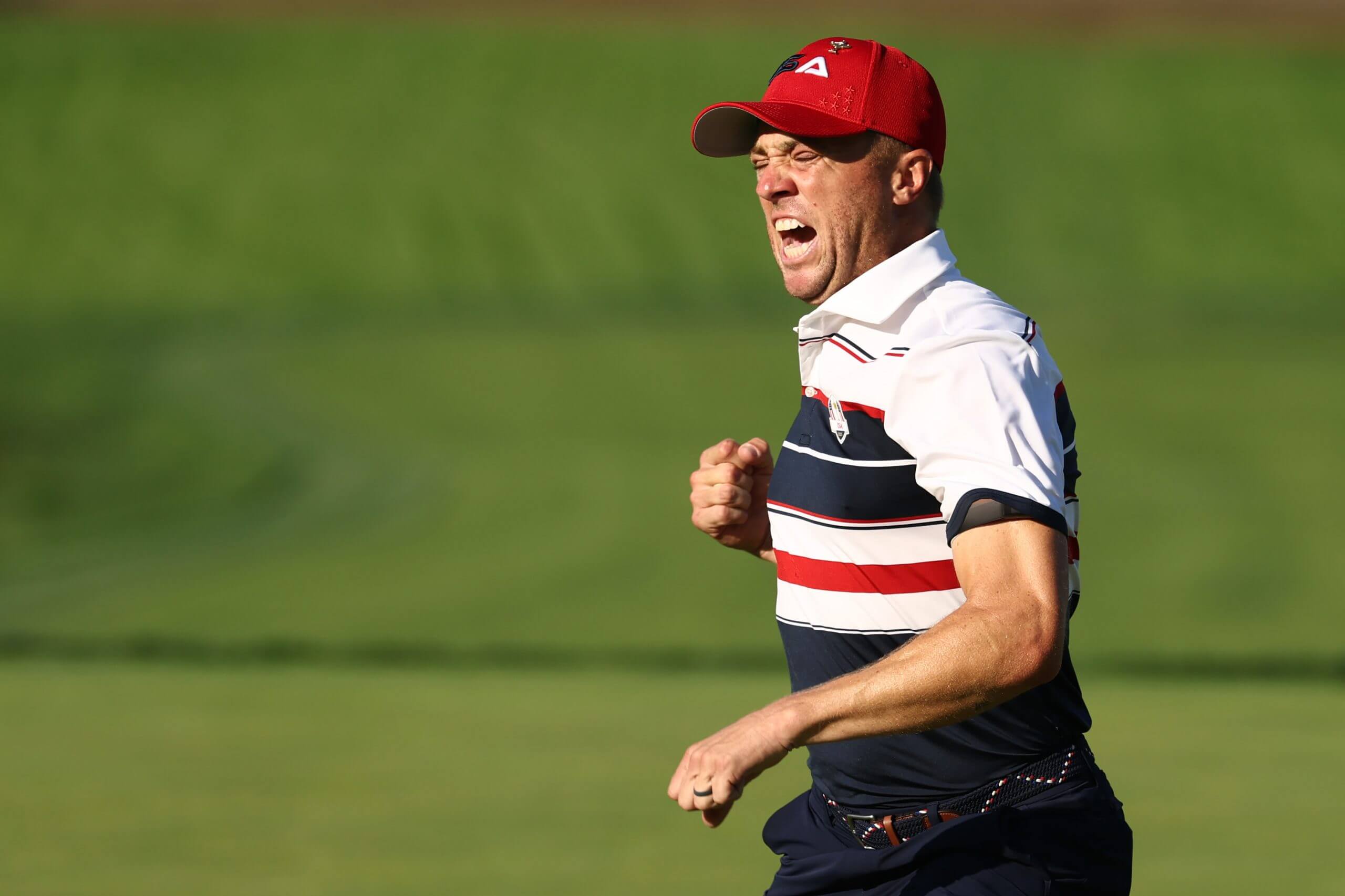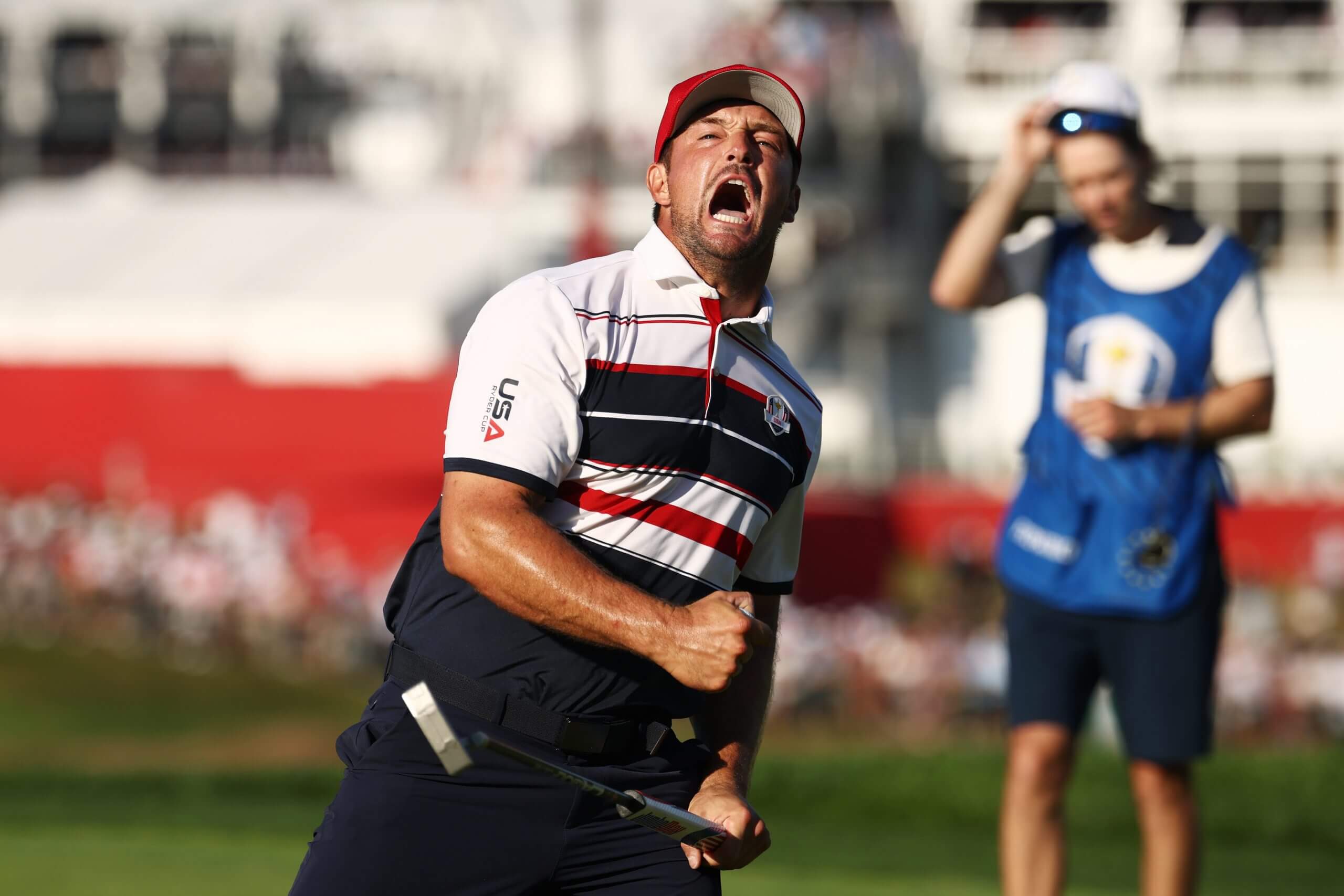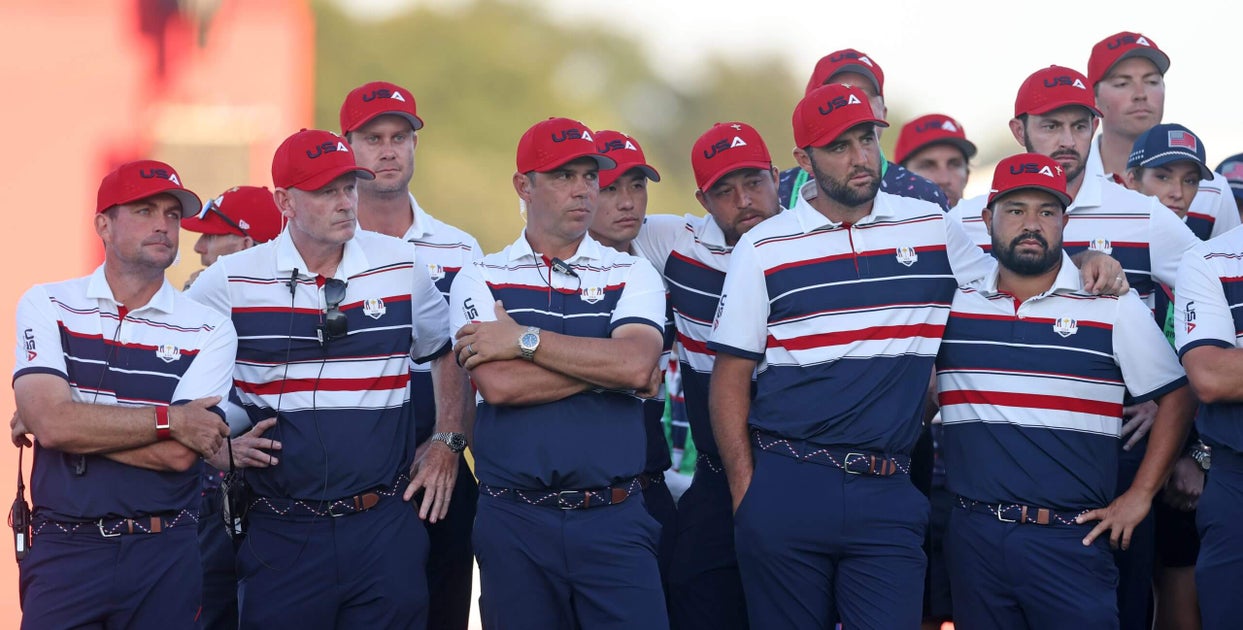FARMINGDALE, N.Y. — Luke Donald stood atop the hill of Bethpage Black’s first tee, arms crossed, dark black sunglasses adorned, looking up at a board of blue. It was 1:06 p.m., and after two days of everything going right, nothing could go wrong.
The captain stared at the board as European player Sepp Straka leaned over for a fist bump before his opening tee shot. Nothing. Straka laughed and playfully reached his hand back out. Donald still didn’t notice. The rather polite 47-year-old Englishman remained transfixed on the massive video board down the hill.
On it, he saw all five ongoing matches highlighted in dark blue. Not just was Europe going to win a road Ryder Cup for the first time in 13 years, but also it was going to shatter every single record in the book.
And then, all hell broke loose.
Over the next four hours, those blue bars turned to gray. Then red. Some history was made. Some more fell short. Obscure rules came into play. Controversies ensued. And the United States performed one of the greatest Ryder Cup comebacks of all time.
It just didn’t win.
As one loss piled into another Saturday evening, Scottie Scheffler looked into the eyes of each teammate he saw, embraced them and smacked them on the arm to fire them up. This was one of the lowest moments of his career — 0-4 at the Ryder Cup — but he withheld any pain for private moments. To everyone else, Scheffler was focused on Sunday.
Captain Keegan Bradley saw it in his team. He saw it that night in the team room. He saw it in the hotel. He saw it in the morning before Sunday singles began. In perhaps the most embarrassing two days of American team golf in decades, as they fell behind by seven points, there was no moping. For some inexplicable reason, the U.S. players thought they could win.
“I was honestly pretty surprised,” Bradley said. “I was on a team that got smoked and we did not have that feeling.”
They did not see the putt go in. They just saw the board change color.
The hills of Bethpage State Park create miniature valleys and canyons throughout the property, and in turn, the grandstands from the 15th to 17th holes create an amphitheater of chaos encircled by huge video boards. Those boards flipped back and forth between a feed of golf coverage and a scoreboard of all 12 matches. But when a shot was being played on one of those holes, the board cut the feed and purely showed the scores so as not to distract the players.
So nobody in this canyon saw Young, a Ryder Cup rookie who holds the course record here, make his 12-foot birdie putt on 18 to beat Justin Rose and launch the party. All they saw was the ugly gray at the top of the board switch to red. The arena roared, each depleted body suddenly beginning to believe.
It caused Justin Thomas to back away from his putt. Echoes were happening across the lengthy property. Up on a cliff across the road, Scheffler had just taken the lead over Rory McIlroy. DeChambeau had birdied to reduce what had been a five-point deficit to one. Even if the task was still monumental, with the U.S. needing to earn 9.5 of 11 points.

Justin Thomas won the second singles point on Sunday. (Jared C. Tilton / Getty Images)
Eyes continued to wander. Scheffler walked off the 17th tee, looking up at the video board. On the screen was Thomas, making his 12-foot birdie putt on 18 to steal his match. The first man he looked for? The infamously monotone and unemotional Young behind the green. Perhaps against Young’s will, Thomas pointed and insisted on a celebratory chest bump. Two points were on the board. Then DeChambeau closed with a tie for another half, throwing his ball into the crowd before high-fiving Bradley and getting emotional in his post-match interview.
“I fought my ass off today for this team, for this country, and we all fought hard today,” DeChambeau said. “… We’re not quitters. We’re not people that go down easy. So, so proud to be a part of this team, and it was great to get a half-point out of it.
“Wish I would have gotten a point, though.”
Perhaps nobody got more of a workout Sunday than Thomas and Young. At least the captains and vice captains had golf carts. But those two had another hour and a half of chasing to do. The mission was to rush to every single match that was closest to winning. The fortunate problem? “It just kept happening and happening,” he joked.
“I’m definitely good walking up that hill on 18. I did that enough today.”
Thomas rushed back down the hill from the 18th and over to the 17th green. A large collection of players, wives and team members from both sides were settling right on the edge of the green. For at least the next 30 minutes, this was the most important place in golf. From that spot, they could see the decisive hole of most matches. They could look down the hill and see approaches into 16, plus the tee shots from 15. And, of course, they had good views of those video boards.
DeChambeau eventually made his way here. One coach grabbed the thick golfer and screamed in his face, “You did this!” By then, Xander Schauffele had taken down European talisman Jon Rahm, 4 & 3.
But Ludvig Åberg finally got some blue on the board, clinching over Patrick Cantlay on 17. Scheffler finished his win over McIlroy to avoid a 0-5 week. The U.S. was inching closer, but because European star Viktor Hovland had to withdraw due to a neck injury, an obscure (and agreed-upon) rule meant the U.S. picked a player to hold out as they halved the match.
It meant as J.J. Spaun and Sepp Straka went to the 17th tee, it was 13 1/2 to 9 1/2. Fourteen points would be enough for Europe to keep it. The U.S. had a path, but it would have to win every single match left. If Europe tied a single one, it would retain the Cup.

Bryson DeChambeau earned a halve. (Jared C. Tilton / Getty Images)
Thomas turned around and squeezed DeChambeau’s leg with anxiety, his face in a nervous grimace. Spaun put his ball in a safe place while Straka had left himself too far. Another victory. Three points separated the sides. The noise continued from everywhere. Down the hill, they could see Irish veteran Shane Lowry stick his approach to three feet on 16. One American staff member whispered, “Shane is the worst putter on the team,” in hopes he’d miss it.
No, Lowry wasn’t actually going to hand anything away. But an American stepped up. Russell Henley — an ugly 0-2 on the week — made a difficult 16-footer to maintain a one-hole lead.
At this point, the European team began to spread out. They needed support around the course. McIlroy, Fleetwood, Rose and Fitzpatrick walked to different holes with different groups. The momentum was all for America.
DeChambeau hopped and skipped in the air like a youthful cheerleader, kicking his legs in wild directions with each leap. Most of the American team made their way up that daunting hill of the 18th green to follow the Henley-Lowry match.
Henley led by one. If Lowry won the hole, Europe would keep the Cup. And in the most important shot of his life, Henley hit a beautiful uphill approach that stuck to 10 feet from the pin. Every bit of American energy around Bethpage Black seemed positive. Almost confident. Family members ate ice cream. Coaches and support staffers smiled. Two more matches behind them turned red for the time being. Henley would win this, surely. Everything was coming up America, right?
Until Lowry put his approach even closer.
The pressure was on Henley. Here was a quiet, considerate 36-year-old family man from Georgia who grinded on tour for a decade to finally make a Ryder Cup team. His entire career built to this moment. If he made this putt, maybe they could really pull this off.
But Henley missed. Moments later, Lowry made his six-foot putt to win the hole, halve the match and officially confirm Europe would at least retain the Ryder Cup. Lowry sprinted around and celebrated with joy. European players screamed and began their celebrations. Schauffele, the stoic American leader, calmly clapped out of respect.
Henley turned purple. One by one, every single American player on that 18th green made their way to him. They grabbed him, said a few words and gave him the largest hug you’ve ever seen, until the next one. But he couldn’t look them in the eye.
Henley was despondent. At least in his mind, he just lost the U.S. the Ryder Cup. Eventually, teammates realized he needed space as he walked over to his bag, still turning colors like he forgot to breathe, while his wife stood nearby. “I’ve never felt nerves quite like that,” Henley said. “It was quite an experience, quite an atmosphere. Very disappointed the way I finished, leaving those putts short.”
Finally, Schauffele walked over to him. He forced Henley to look at him, and whatever he said, he was the first to make Henley laugh.
Every player on the team tried their absolute hardest to look to their left and listen to Cameron Young answer a question. They all heard it. Of course, they did. As they sat there, a giggling European team trotted towards the putting green with flags and beers and the joy that only comes with winning this Cup. In the end, Europe halved two more matches to win 15-13. Henley’s putt did not decide it, nor did Hovland.
The U.S. had just pulled off one of the most impressive Sundays in Ryder Cup history. After being the first home team to ever lose all the first four sessions, it tied the Sunday record by earning 8 1/2 of 12 possible Sunday singles points, the same amount Europe won in 2012 to pull off the infamous “Miracle at Medinah.”
Europe won just one match out of 12 on Sunday. That’s the lowest since 1957. Nobody in the modern era had ever so fully controlled the Ryder Cup’s final day.
Yet the points earned on Friday and Saturday count the same as they did on Sunday. It was too little too late. Europe was still the team walking by that clubhouse, making noise as the U.S. wrapped up its news conference. All 11 other American players kept their faces locked on Young in the corner.
Except Bradley. The U.S. captain didn’t listen to a word Young said. With his head resting on his hand, his piercing eyes stared right at the pain coming toward him. For a full minute, he watched the European celebration.
Bradley and all his players spent the time after the Cup finished talking proudly about what they just did. They talked about how they fought and represented their country. How they all became closer because of the shared experience. They seemed to mean every word. It just didn’t mean it didn’t hurt.
“To watch them go out all week and hold their heads high and then go out there today and do what they did,” Bradley said, “is close to a miracle.”
(Top photo: Carl Recine / Getty Images)

